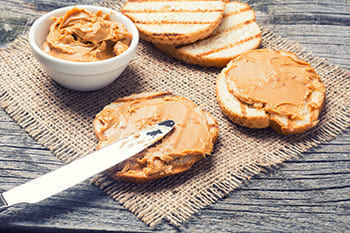Peanut butter: healthy or calorie bomb?
Content:
- How healthy or unhealthy is peanut butter really?
- Is peanut butter healthy?
- Peanut butter has positive effects on heart health and cholesterol levels
- Peanuts can reduce the risk of diabetes
- Peanut butter as part of the diet for muscle building
- How peanut butter helps you lose weight
- An overview of the nutritional values of peanut butter
- Is all peanut butter healthy?
- Peanut butter as a healthy part of the diet: What you should consider
- Conclusion: Peanut butter as a healthy snack instead of a calorie bomb
Peanut butter is really that healthy or unhealthy
For breakfast on toast, in curries or sauces, as a sandwich or simply pure as a snack in between - peanut butter is popular with many. Unfortunately, the peanut cream not only tastes particularly delicious, but also has quite a few calories. Therefore, it is rather known as a calorie bomb and most people who want to eat consciously, crossed off the diet plan. But this does not necessarily have to be, because in peanuts is much more than "only" fat!
Whether for muscle building or during a diet to lose weight: Peanut butter is not only healthy, but also a perfect snack for athletes. We'll explain what nutrients make peanut butter so healthy and how it can help you reach your goals.
Is peanut butter healthy?
Peanut butter contains unsaturated fatty acids and vegetable protein, as well as fiber and other valuable minerals such as zinc, potassium, magnesium, vitamin E and arginine. All these ingredients are involved in various important functions in the body and are part of a balanced diet.
Therefore, looking at the nutrients, we can say that peanut butter is healthy. So, good news for everyone who likes to use peanut butter as a snack, spread, topping or in sauces.
Peanut butter has positive effects on heart health and cholesterol levels

Peanut butter has a high content of unsaturated fatty acids.[1] These not only have a positive effect on heart and brainhealth , but also boost metabolism and have an anti-inflammatory effect.[2] At the same time, unsaturated fatty acids can also help lower bad cholesterol (LDL = low density lipoprotein) and promote the formation of good cholesterol (HDL = high density lipoprotein)[3] This has a positive effect on heart health. Regular consumption of peanut butter may be healthy for your heart due to the unsaturated fatty acids[4],[5] and your cholesterol levels[6] - however, this effect refers to consumption in moderate amounts.
Peanuts can reduce the risk of diabetes

In addition to reducing bad cholesterol, peanut butter can do much more. As part of a large-scale study, researchers found that peanut butter can help reduce the risk of type 2 diabetes. Women who ate nuts or peanut butter five times a week had a 20 percent lower risk of developing this type of diabetes than women who rarely or never ate nuts or peanut butter.[7]
Scientists attribute this effect to the healthy fats in peanut butter. These are known to improve insulin resistance and have a positive effect on blood lipid levels.[8] In addition, peanuts contain a lot of magnesium, which also helps stabilize insulin balance.
Peanut butter as part of the diet for muscle building

If you want to build muscle mass, you need a calorie surplus . Therefore, peanut butter can helpbuild muscle because it containsa lot of fat and a lot of calories. However, when it comes to fat, it is not only the quantity that matters, but also the quality. Peanut butter offers the advantage that it contains a high proportion of unsaturated fatty acids, which are better for the body than saturated fatty acids. In addition, peanut butter convinces not only with healthy fats but also with a lot of protein as well as few carbohydrates, which makes it a perfect companion for athletes. Protein has been shown to help build and maintain muscle mass, which can help you achieve your goals.
How peanut butter helps you lose weight

Peanut butter is known by most people as a calorie bomb. Peanut butter for weight loss sounds rather strange - but it is not at all, because the nut butter can support you in a diet to lose weight in many ways, for example, by the fiber contained. These are not only important for digestion, but also keep you full for a long time due to the high energy content and the low water content. This can prevent cravings and thus help you lose weight. Apart from that, the contained protein is also a useful support. Because to digest protein, the body needs a lot of energy. This boosts the metabolism and thus also the fat burning process. Protein also keeps you full longer, because your body takes longer to digest a protein-rich meal.
By the way, science is also of the opinion that peanut butter is good for weight loss. A meta-study of 51,000 women found that women who ate nuts at least twice a week had a lower risk of obesity and weight gain than women who rarely reached for nuts.[9]
Peanut butter nutritional values at a glance.
Strictly speaking, peanuts are not nuts, but legumes. However, their nutritional profile doesn't have to hide when compared to real nuts: Two tablespoons of peanut butter provide seven grams of protein, 16 grams of fat and two grams of fiber. It is precisely this composition that makes peanut butter so filling. Despite the many calories due to the healthy fats, peanut butter is an ideal power snack for in between meals due to the protein it contains and the few carbohydrates. In addition, peanut butter contains other valuable nutrients such as the minerals magnesium, zinc, potassium, arginine and vitamin E.[10]
The nutritional values of 100 gram Peanut butter using the example of our ESN Peanut Butter at a glance:
- 634 kcal
- 50.1 g fat
- 9,8 g dietary fiber
- 13,1 g carbohydrates
- 27,3 g protein
Is all peanut butter healthy?

Despite all the benefits, you should take note: Not all peanut butter is healthy. Ideally, peanut butter shouldcontain only one or two ingredients , peanuts and some salt. Often, peanut cream or peanut butter contains a lot of hidden sugar, which significantly reduces the health benefits of peanut butter.
Often, peanut cream, peanut butter and co. also contain hydrogenated oils, which belong to the monounsaturated fatty acids. The addition is supposed to make the peanut butter creamier and longer lasting, but saturated fatty acids are significantly more unhealthy than unsaturated fatty acids. Also, not every peanut butter advertised as low-fat is automatically healthy, but here you should pay close attention to the ingredients. Some manufacturers add sugar or other fats to the peanut cream anyway, which means that the nut butter contains the same amount of calories as other products.
By the way, our ESN Peanut Butter only contains what it is supposed to contain, namely 100 percent peanuts. Whether crunchy or smooth - you'll look in vain for additional sugar, hydrogenated fats or palm oil. This does not affect the shelf life: stored in a cool, dry and dark place, our peanut butter with the extra protein will keep for a good three months.
Erdnussbutter kaufen von ESN
- Ohne Zusatz von Zucker, Palmöl, Konservierungsstoffen
- Natürliche und gute Proteinquelle
- Hoher Ballaststoffgehalt
Peanut butter as a healthy part of your diet: here's what you should consider
To use peanut butter as a healthy addition to your diet, there are a few basic factors to consider. These include:
- Quantity matters: Although peanut butter is fundamentally healthy, you can't eat an unlimited amount of it. In fact, the healthy effect only applies to reasonable amounts. A standard serving of peanut butter consists of only two tablespoons with a total of 200 calories. This is adequate as part of a satisfying meal. If you like to use peanut butter as a snack between meals, you should stick to a few teaspoons.
- Pure nature: To be healthy, peanut butter should be as natural as possible. This ensures that it contains no unhealthy fats or other artificial additives. The proportion of peanuts should be at least 70 percent, 100 percent is of course better.
- Peanut butter or peanut butter: If you don't want to look at the ingredients, you can also use peanut butter. As a rule, these products are always made from 100 percentpeanuts.
- Do it yourself: If you feel like it, you can also make peanut butter, peanut cream or peanut butter yourself. Simply mix peanuts with a little peanut oil and salt and you're done.
- Say no tosugar: Many manufacturers add sugar to their peanut butter Whether white sugar, agave syrup or raw cane sugar - sugar remains sugar. Not only is it unhealthy, it also adds calories to peanut butter. That's why you should go for a peanut butter without added sugar if possible.
- Watch out for carbohydrates: Even though the famous peanut butter sandwich is simply delicious, ideally you should not combine peanut butter with carbohydrates. The reason: carbohydrates cause the release of insulin[11],[12] which in turn blocks the burning of fat and promotes the storage of fat[13] If you still don't want to give up peanut butter as a spread, it is recommended that you use whole grain bread.
Conclusion: Peanut butter as a healthy snack instead of a calorie bomb
When eaten in moderation, peanut butter can be healthy and have a positive effect on heart health, cholesterol levels and muscle growth. At the same time, the protein-rich peanut butter with its many healthy fatty acids can also help you lose weight. However, the most important prerequisites for this are the right amount and good ingredients. That's why it's best to choose peanut butter with 100 percent peanuts, like our ESN Peanut Butter. That way, you can be sure there are no ingredients like unhealthy fats or added sugar.
If you're not a peanut fan or suffer from food allergies (not uncommon with peanuts, unfortunately), you can also use creams made from other nuts or seeds. Alternatives include creams made from almonds or cashews, which have similar nutrients and vitamins to peanut butter.
References
- https://www.scirp.org/html/5-2700529_25267.htm
- https://pubmed.ncbi.nlm.nih.gov/28620111/
- https://www.scirp.org/html/5-2700529_25267.htm
- https://www.mdpi.com/2072-6643/11/7/1508
- https://www.scirp.org/html/5-2700529_25267.htm
- https://www.tandfonline.com/doi/abs/10.1080/07315724.2004.10719408
- https://pubmed.ncbi.nlm.nih.gov/12444862/
- https://lipidworld.biomedcentral.com/articles/10.1186/s12944-015-0123-1
- https://academic.oup.com/ajcn/article/89/6/1913/4596881
- https://www.scirp.org/html/5-2700529_25267.htm
- https://journals.physiology.org/doi/abs/10.1152/ajplegacy.1963.205.4.638
- https://www.jci.org/articles/view/105534
- https://link.springer.com/article/10.1007/s12020-007-0021-z








